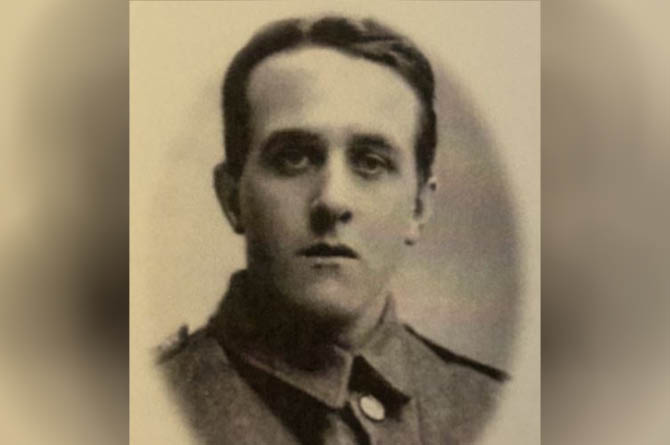Support quality, independent, local journalism…that matters
From just £1 a month you can help fund our work – and use our website without adverts. Become a member today

Children from White Rose Primary School have been learning about the heroic deeds of a World War One soldier from New Tredegar, who made a daring and successful escape from a German prison camp.
As part of a project, led by trainee teacher Ellen Jones, pupils have been designing medals, creating drawings, writing poems and comic books – all inspired by the story of Private Robert Phillips.
The children also created a poppy wreath using hand prints and walked to the local cenotaph to pay their respects.
Pte Phillips’ granddaughter Lynda Osborne, who spent decades researching the full history surrounding the daring escape, visited and spoke with the children and showed them his medals, his inscribed pocket watch, and original diary.
The children’s work is now on display at the White Rose Centre in Elliots Town, New Tredegar.

The story of Pte Robert Phillips
On the outbreak of war in 1914, Robert Phillips, a collier from New Tredgar, enlisted in the Welsh Regiment.
Having seen action in the first battle of Ypres, in Belgium, in which he was injured in a gas attack, Phillips was captured by German forces in 1915.
He was then taken to a prison camp in Münster, Germany, before being moved to Homberg.
Forced to work by his captors underground, Private Phillips, along with other prisoners, hatched a daring escape plan.
The other prisoners reasoned it was too risky, but after 15 months of brutal treatment, Phillips had had enough.
After studying the shift patterns of the guards, he noticed a gap and one night simply walked out of the camp disguised as a German soldier and whistling German tunes he had learnt.
Travelling through Germany and finding shelter with a Dutch family in the Netherlands, Phillips eventually made his way home. He arrived in Cardiff on Christmas Day 1916.
On his return to New Tredegar he was given a hero’s welcome with thousands turning out to greet him. The local community presented him with an inscribed gold watch.
However, he soon discovered that his clothes and his bicycle he had left at his lodgings had been sold because nobody expected his return.
Shell-shocked and injured, he did not return to battle and was discharged from the army in 1919.
After a long recuperation, he went back to work at Bedwas Colliery.
After surviving the war, he was killed underground in Bedwas aged 40 when a pit prop collapsed.
Support quality, independent, local journalism…that matters
From just £1 a month you can help fund our work – and use our website without adverts.
Become a member today
